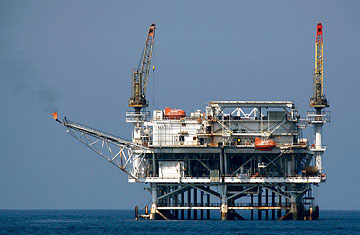
An offshore oil rig is seen in the Catalina Channel near Long Beach, Calif.
In the dimly lit chamber of the U.S. House of Representatives, some 25 Republican members took the floor Monday, talking to only a peanut gallery of journalists and hordes of tourists they'd invited to fill their absent Democratic colleagues' seats.
Their message was none too subtle: Congress has done nothing to address soaring gas prices, and the people's representatives shouldn't be starting their August recess until they do. One member even drove his minivan, family included, all the way from Illinois, arriving at 3 a.m., so he could get his turn to lambaste the Democrats for not allowing a vote on a bill to expand offshore drilling. To drive their point home, members waved empty gas cans, charts of fuel prices and blown-up photos of Speaker Nancy Pelosi.
The House members were simply following the lead of their party's presumptive presidential nominee, John McCain, who, along with his Democratic opponent Barack Obama, is bringing energy policy to the forefront of the increasingly nasty campaign. In recent days, McCain has hammered Obama for his opposition to offshore drilling and his support of alternative conservation measures like inflating tires, while Obama has countered with attacks painting the Arizona Republican as a puppet of Big Oil. But both in Congress and on the campaign trail, the fight has turned into little more than a sound-and-light show, full of heated rhetoric but offering little chance for meaningful action, at least before it's clear who will be the next man in the White House.
It's not hard to see why the the GOP has latched onto gas prices as a lifeline in an otherwise hostile political environment. Polls show it is the one area where it runs even with, or anywhere close to, its Democratic counterpart, on the issue of which of the two parties would better handle the economy. As they have felt increasing pains at the pump this summer, voters have shown more willingness to allow drilling off U.S. shores, open up Alaska's Arctic National Wildlife Reserve and expand drilling in Western lands — all things the Dems have opposed. "There is nothing that the Republicans are proposing that will have an impact on the price at the pump," Pelosi told reporters before adjourning Congress last week. "Yeah, 10 years from now, two cents; but what we are saying is, Free our oil in 10 days, not 10 years. And that's what we will keep pushing."
Obama himself is recognizing the shifting winds, and, while calling Monday for a windfall tax on oil-company profits and the opening of the nation's strategic petroleum reserve, he has also said he is open to some kind of compromise that would combine an expansion of offshore drilling with greater support for development of alternative sources of energy.
In a heated election year in which neither side wants to hand the other a legislative victory, this all amounts to mere posturing. And some energy analysts say that's a good thing. Prices have already started to drop a bit in recent weeks, and odds are, in the fall they will plunge further as refiners ease away from the expensive cocktails they are forced to use to prevent gas from evaporating in the summer, consumption drops and speculators begin to anticipate a flat U.S. economy over the next few quarters, said Greg Valliere, chief political strategist at Stanford Washington Research Group. "Gas prices are headed lower in the coming weeks because the oil futures market finally is reflecting supply-demand shifts," Valliere said. "There is no policy initiative that could have done this, nothing from Washington. Market forces finally are dominating the speculators." And at least with the lights off, the Republican representatives who plan to spend all week talking gas prices on the shuttered House floor will be doing their part to save electricity.
